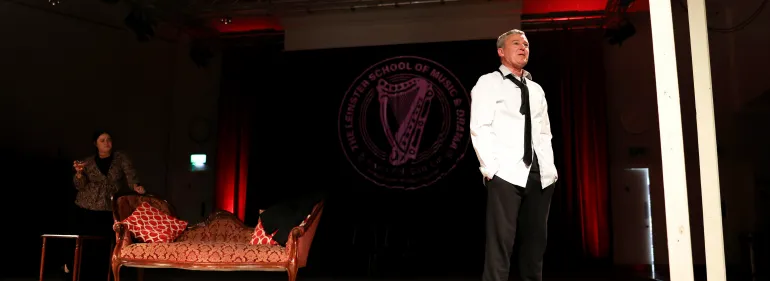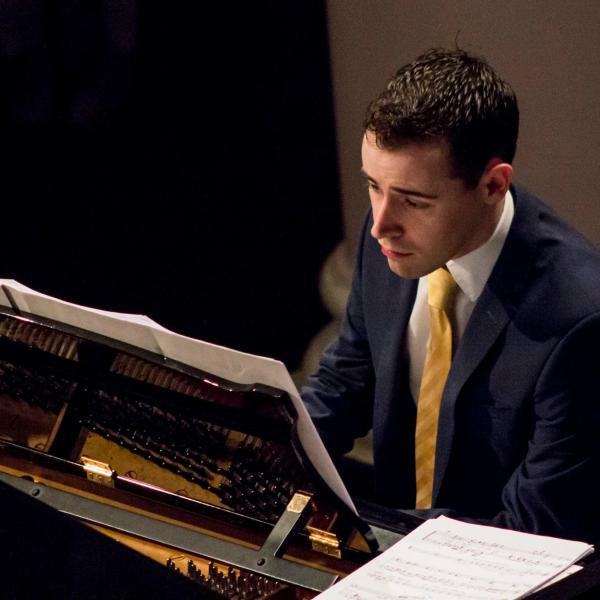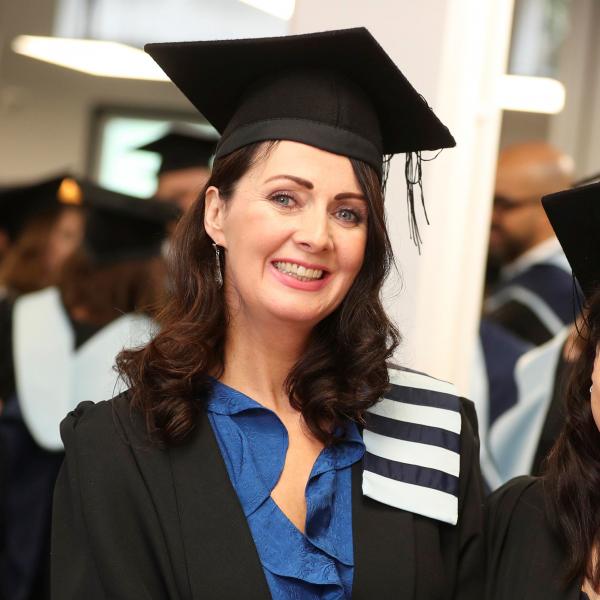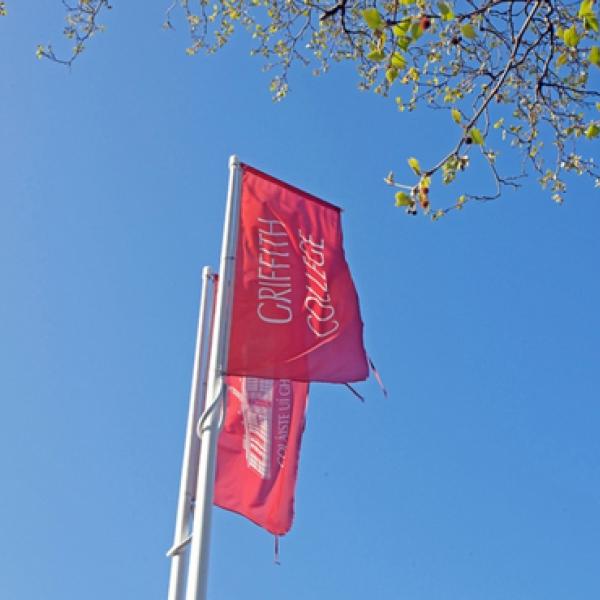Higher Diploma in Arts in Drama Education

Course Overview
Internationally recognised course geared towards unearthing the next generation of world-class drama and arts teachers
This drama course is designed for the contemporary practitioner in drama education, whether you are interested in teaching in a school or running a practice or studio.
Why Study Drama Education at Griffith College?
The Higher Diploma in Arts in Drama Education is one of Ireland’s only specialised certifications in drama education qualifications. This course is available on a part-time basis over 1-year and comprises six modules. This course provides a pathway for the progression of drama students to drama educators, as well as a professional development opportunity to revitalise the practices of existing drama teachers.
*Please be aware this course is subject to validation and subject to numbers.
Below are some of the benefits of enrolling:
- Modules are certified under QQI's Accumulation of Credits and Certification of Subjects Scheme (ACCS).
- A range of study options are available including part-time evening study, with the possibility to take the programme in three stages under the QQI ACCS scheme.
- Access to performance-oriented facilities, including a 600-seater concert hall and an impressively stocked drama library.
- Highly focused and experienced teachers, many of whom are active in the performance arena.
Course Highlights
- Provides a pathway for the progression of drama students to teachers.
- Can be utilised as a professional development programme to revitalise the practice of existing teachers.
- Learners are given a thorough grounding in the theories and processes of teaching drama, and provided with detailed knowledge and practice of drama creatively, practically and pedagogically.
- Fully accredited by QQI, making them internationally recognised accredited qualifications. The LSMD is the only institution in Ireland offering QQI validated specialised drama education qualifications.
- Flexible schedule with part-time evening study, and day-time sessions (a mixture of Saturdays and Sundays), with the possibility to take the programme in three stages under the QQI ACCS scheme.
- Access to performance oriented facilities, including a 600-seater concert hall and an impressively stocked drama library.
Intake Dates
- Dublin - Part-Time - September 2025
What our students say

I thoroughly enjoyed doing my H.Dip with The LSMD at Griffith College! It exposed me to a broad range of modules and was tailored to our strengths and needs. Since completing the course I have gone on to do a Masters and I now teach piano and music theory.
Higher Diploma in Arts in Music Education

This course gave me great confidence as a teacher as I directly applied the learning in the classroom, with positive outcomes across the board. I am now teaching drama full time and the children are enjoying my drama classes – they are engaged and listening and participating.
Higher Diploma in Arts in Drama Education
Course Details
Students on the Diploma study six modules.
Core Subjects
The module provides learners with classic and contemporary techniques that are relevant to modern theatre practice. The taught programme develops the learners’ skills allowing them to connect with, and recreate, the world around them through the understanding of postural forms, gestures, command of space as a substance to create objects, movement, identification with objects, breath and energy. Finally, they learn to to create a narrative that has a central character and dilemma.
A large part of drama teaching involves the skill of directing. Whether working in the private or public sector, performance, of some kind, is ultimately expected. This module gives learners a grounding in improvisation, which is the basis for devising, and then moves on to working with text. Learners are introduced to a variety of situations where they might need to draw on these different skills and tools, from entering grade exams, putting on their own school productions or devising with community/youth groups.
This module consists of three elements. The first element deals with an examination of the theories and processes of teaching, learning and pedagogy as well as the integral part played by assessment in the process, in-group teaching and with individuals. The teaching of drama in the specified curriculum and classroom management is also examined in this section. The second element involves the practical application of the theories and learning in this and other modules in a practical teaching setting. The third element consists of an examination of the theory of inclusion. It deals with defining inclusion and looking at different models of assessing the learner.
This module affords the learner an opportunity to develop a practical business overview of their business that includes important aspects to protect both themselves and the learner in a competitive market. The content examines areas including health and safety, child protection, insurance, data protection, copyright and SME management.
Learners are able to design effective classes for their ‘learners in a context’ informed by the main theories of learning and understanding different approaches to learner motivation. Learners can format classes informed by understanding the human limits of attention, perception and memory. Learners can structure lesson development through informed application of instructional design theories.
Part 1: Theatre Histories aims to provide learners with an awareness of the diversity of theatrical styles and encourage the learner to consider ways to relate historical works and conventions in a classroom setting. Part 2: Production and Technical Theatre aims to provide learners with a knowledge base and planning strategy to develop and present a theatre production in a managed and safe way and encourage the learner to apply these principles in the classroom. Part 3: Application of Directing aims to put into further practice the skills that have been developed throughout previous modules with regard to directing. Learners direct a scene, from a period covered in Theatre History, and use theatrical elements of Production to enhance the performance.
Course Contacts

Suzanne Binley
- Dublin Main Campus
Timetables
How to Apply
How to Apply
All applicants must apply directly through Griffith College using the Apply Online facility.
Entry Requirements
A primary degree in a drama-related field OR a primary degree in a non-cognate (unrelated) discipline + Grade 10 in Speech and Drama from The LSMD, or an approved substitute.
Candidates with significant prior experience in drama education or performance may also be considered under the College’s APL and APEL policy. In all such cases, candidates will be required to submit their application for consideration by the College’s academic and professional council and may be required to present for an interview and/or audition.
English Language
If English is not your native language, you must show proof that your English language proficiency is a suitable standard.
Griffith College accepts the online Duolingo English Test (DET) as valid proof of English proficiency.
For further information about the course, please contact the Admissions Team at admissions@griffith.ie.
Fees
For purposes of fee calculation, residence is counted from time of application.
Tuition Fees
Study Mode: Part-time
Dublin
EUR 5370.00
General Fee Information
An Academic Administration Fee of EUR250.00 and a 2% Learner Protection Charge is applicable each academic year in addition to the fees quoted below.
Study Mode: Full-Time
Please refer to the Irish/EU Living Abroad Fees.
General Fee Information
An Academic Administration Fee of EUR250.00 and a 2% Learner Protection Charge is applicable each academic year in addition to the fees quoted below. The fees below relate to Year 1 fees only.
Flexible payment options
Students wishing to pay their fees monthly may avail of our direct debit scheme. Please view our Fees information page for more information and assistance.
Sponsorship
Is your company paying for your course?
They will need to complete a Griffith College Sponsorship Form and send this to the Student Fees Office:
- Post: Student Fees, Griffith College Dublin, South Circular Road, Dublin 8
- Email: accounts@griffith.ie
2% Learner Protection Charge
All QQI accredited programmes of education and training of 3 months or longer duration are covered by arrangements under section 65 (4) of the Qualifications and Quality Assurance (Education and Training) Act 2012 whereby, in the event of the provider ceasing to provide the programme for any reason, enrolled learners may transfer to a similar programme at another provider, or, in the event that this is not practicable, the fees most recently paid will be refunded.
QQI Award Fee
Please note that a QQI Award Fee applies in the final year of all QQI courses. To find the relevant fee for your course level, please see the Fees page.
Progression
Academic Progression
Graduates of the Higher Diploma in Arts in Drama Education may progress on to study a Level 9 degree.
Career Progression
Graduates of this programme have gone on to work in many different sectors, and are gainfully employed in areas such as the Department of Education, primary and secondary schools, performing arts, or private speech and drama schools around the country, and within the early-years sector.
Many graduates have established their own businesses, such as private classes, drama schools, and performing arts schools.

